Theater / Film
‘Here There Are Blueberries’ Comes Home To Miami New Drama
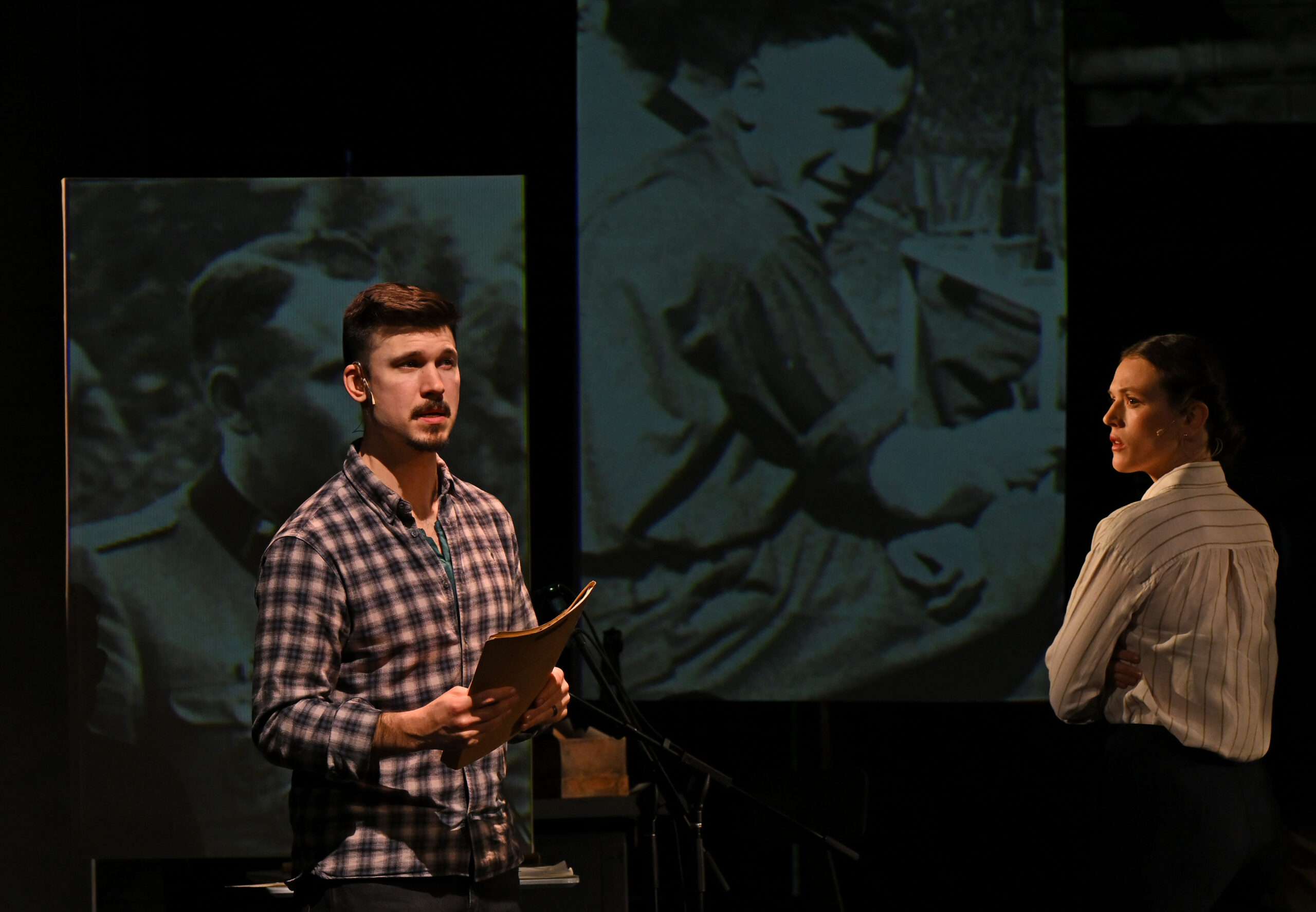
Marrick Smith (as Rainer Höss) and Delia Cunningham (as Rebecca Erbelding) appear in the 2025 tour of “Here There Are Blueberries.” The two appear in the Miami New Drama production, which runs Thursday, Nov. 13 through Sunday, Dec. 7 at Miami New Drama’s Colony Theatre, in Miami Beach. (Photo by Kevin Parry Photography)
Eight years ago, inside Miami Beach’s Colony Theatre, a group of actors and researchers gathered around a reproduction of a strange object: a photo album filled with images of Nazi officers smiling, picnicking, and eating blueberries at Auschwitz. That first workshop, then titled “The Album,” marked the quiet beginning of a play that would go on to travel the country, earn critical acclaim, break box-office records, and become a 2024 Pulitzer Prize Finalist for Drama. Now, the play returns to the very stage where it was born.
“Here There Are Blueberries”—co-written by Moisés Kaufman and Amanda Gronich and directed by Kaufman—will run Nov. 13 through Dec. 7 at Miami New Drama’s Colony Theatre. This time it arrives not as a work-in-progress, but as an award-winning production with a national tour, a CBS “60 Minutes” feature, and an audience already primed to attend.
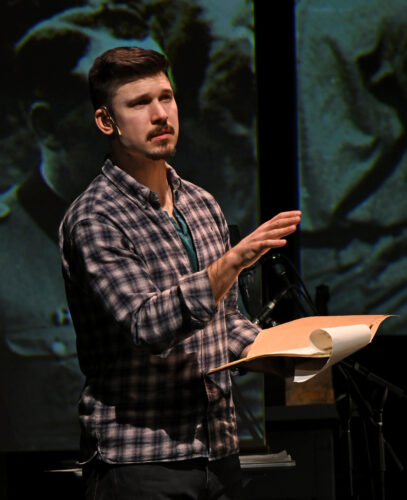
Actor Marrick Smith, as Rainer Höss in the play’s 2025 tour, captures the haunting restraint of “Here There Are Blueberries.” (Photo by Kevin Parry Photography)
“The DNA of the play was born in Miami,” says Kaufman, the Venezuelan-born creator of “The Laramie Project” and “Gross Indecency.” “Amanda and I always say it wasn’t just workshopped at Miami New Drama: it was built there. The architecture of the play was created in that rehearsal room.”
Some of the original cast members who helped build it are returning to perform it again, including Barbara Pitts McAdams and Grant Varjas—a rare instance of actors re-inhabiting roles they helped shape from the ground up.
The play begins not with a battlefield, but with an envelope. In 2007, the U.S. Holocaust Memorial Museum received a package containing a private photo album belonging to SS officer Karl Höcker. The images, never meant for public view, showed officers eating fruit, decorating Christmas trees, singing, relaxing with their dogs. All of it at Auschwitz.
Kaufman, a child of Holocaust survivors, had long wanted to write a play on the subject but resisted adding to what he calls “the most documented event in modern history.” The Höcker album changed that.
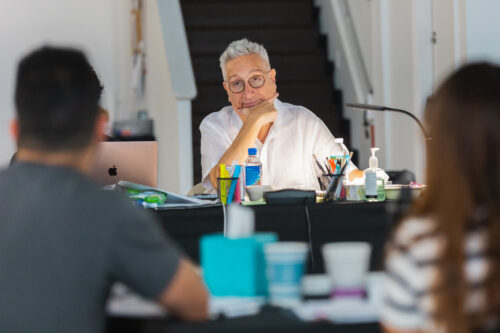
Moisés Kaufman—shown here during the 2025 table reading of “Here There Are Blueberries”—long wanted to write a play about the Holocaust but hesitated to add to what he calls “the most documented event in modern history.” The discovery of the Höcker album changed that. (Photo by Morgan Sophia Photography)
“When I saw the photographs, I thought: this is new. We’ve never seen the perpetrators like this,” he says. “I became obsessed with the idea that photographs could carry the narrative, that a play could ask the audience to look, to decode, to become investigators themselves.”
The core storyline—museum archivist Rebecca Erbelding receiving the album and slowly decoding the faces—was already in place in the 2018 Miami workshop. What has evolved is a second dramatic thread: the descendants of the perpetrators reckoning with what they inherited. “That wasn’t there at the beginning,” says Kaufman. “Now it makes the play land in a deeper way.”
That shift also sharpened the play’s relevance.
“Whenever there is man’s inhumanity to man, the play is relevant,” he says. “The dictatorship in Venezuela could not have happened without accomplices, without people who participated, and without people who looked away. That is the same question the play is asking: where do we fall between culpability, complicity, and complacency?”
For Venezuelan Michel Hausmann, Miami New Drama’s founding artistic director, the play’s return is more than a booking. It is a mirror held up to a city built by people who fled authoritarian states.
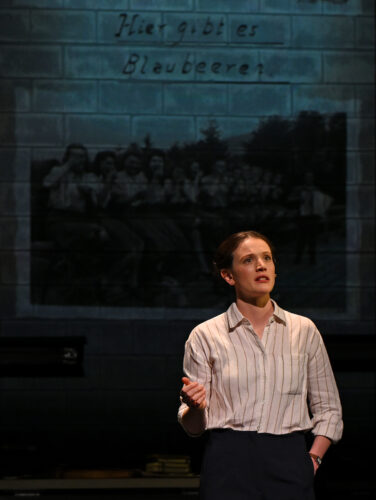
Delia Cunningham as Rebecca Erbelding in the 2025 tour of “Here There Are Blueberries.” She returns for Miami New Drama’s production. The play opens at Miami New Drama Thursday, Nov. 13 through Sunday, Dec. 7. (Photo by Kevin Parry Photography)
“Miami is full of people who escaped surveillance, repression, propaganda,” he says. “This play will not feel foreign here. We know what it means to watch a country collapse because too many stayed silent.”
Hausmann invited Kaufman and Tectonic Theater Project to develop the work in Miami in 2017, at a moment when nationalist populism was rising globally, at home and abroad.
“None of these regimes succeed without collaborators,” he says. “It’s not just the people who do the harm, but the people who allow it.”
In “Here There Are Blueberries” there are no reenactments, no camp scenes, no actors playing victims. “The horror lives in the silence, in the gap between what the photographs show and what the audience knows was happening just beyond the frame,” says Kauffman. “The play reveals not the brutality of genocide, but the comfort that coexisted with it.”
The title comes from a handwritten line in the album, casually noting a plate of blueberries served after lunch. An ordinary pleasure inside a death camp.
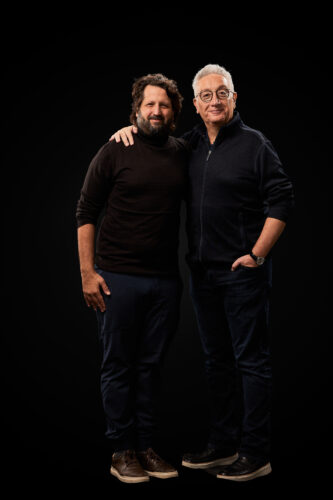
Miami New Drama Artistic Director Michel Hausmann (left) and Tectonic Theater Project Founding Artistic Director Moisés Kaufman (right) first began developing “Here There Are Blueberries” in Miami in 2017. (Photo by FURIOSA Productions)
Kaufman describes the audience response the same way in every city: “I’ve never heard a theater so quiet. People stop being spectators. They lean forward, scanning the projected images, trying to solve them. They become witnesses.”
Since leaving Miami, the play has been produced at La Jolla Playhouse, where it was named one of the Los Angeles Times’ Best Plays of 2022; at Washington D.C.’s Shakespeare Theatre Company, where Kaufman won the Helen Hayes Award for Outstanding Director; and at New York Theatre Workshop, where it became the highest-grossing production in the theater’s 45-year history. CBS’ “60 Minutes” profiled the play earlier this year.
Still, the Miami return carries a different weight.
“This is the room where it started,” says Kaufman. “To bring it back—with Amanda’s name on it, with the actors who built it—that feels like completion.”
WHAT: Miami New Drama’s “Here There Are Blueberries”
WHERE: Colony Theatre, 1040 Lincoln Road, Miami Beach.
WHEN: Opens Thursday, Nov. 13 through Sunday, Dec. 7.
Hours: Opens 7 p.m., Thursday, Nov. 13. Shows 7:30 p.m., Thursday, Friday and Saturday, Matinees, 2 p.m., Saturday and Sunday. 6 p.m., Sunday, Dec. 7.
COST: $35-$99
INFORMATION: 305-674-1040 and miaminewdrama.org
ArtburstMiami.com is a nonprofit media source for the arts featuring fresh and original stories by writers dedicated to theater, dance, visual arts, film, music and more. Don’t miss a story at www.artburstmiami.com.
